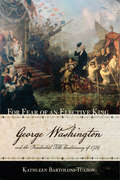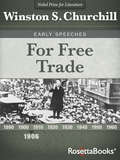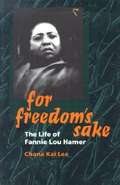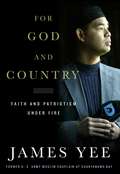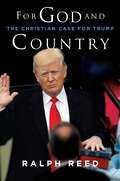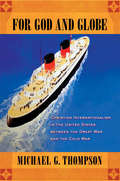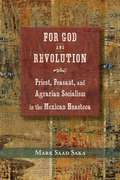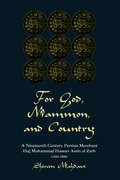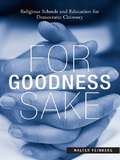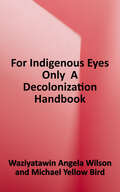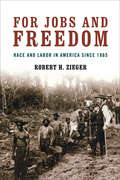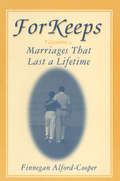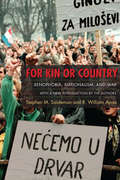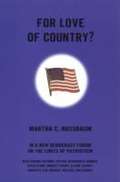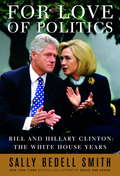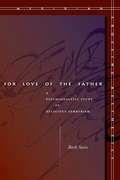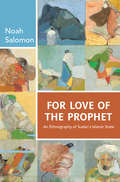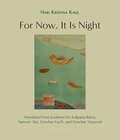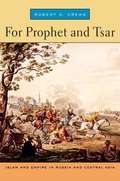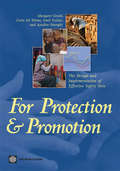- Table View
- List View
For Fear of an Elective King: George Washington and the Presidential Title Controversy of 1789
by Kathleen Bartoloni-TuazonIn the spring of 1789, within weeks of the establishment of the new federal government based on the U.S. Constitution, the Senate and House of Representatives fell into dispute regarding how to address the president. Congress, the press, and individuals debated more than a dozen titles, many of which had royal associations and some of which were clearly monarchical. For Fear of an Elective King is Kathleen Bartoloni-Tuazon's rich account of the title controversy and its meanings. The short, intense legislative phase and the prolonged, equally intense public phase animated and shaped the new nation’s broadening political community. Rather than simply reflecting an obsession with etiquette, the question challenged Americans to find an acceptable balance between power and the people’s sovereignty while assuring the country’s place in the Atlantic world. Bartoloni-Tuazon argues that the resolution of the controversy in favor of the modest title of "President" established the importance of recognition of the people's views by the president and evidence of modesty in the presidency, an approach to leadership that fledged the presidency’s power by not flaunting it. How the country titled the president reflected the views of everyday people, as well as the recognition by social and political elites of the irony that authority rested with acquiescence to egalitarian principles. The controversy’s outcome affirmed the republican character of the country’s new president and government, even as the conflict was the opening volley in increasingly partisan struggles over executive power. As such, the dispute is as relevant today as in 1789.
For Free Trade (Winston S. Churchill Early Speeches)
by Winston S. ChurchillThis collection of speeches in support of free trade by the future Prime Minister tracks his early rise in British Parliament. Throughout his career—as both a Conservative and a Liberal—Winston Churchill was a strong supporter of free trade. As a Conservative, this position was sometimes controversial; early in his career, Churchill opposed Joseph Chamberlain's strategy of imposing tariffs to protect Britain&’s economic dominance. When he defected to the Liberal Party in 1904, Churchill continued to be a fierce free trade advocate. Originally published in 1906, For Free Trade was an influential political pamphlet that made Churchill&’s speeches on the subject available to the British people. This collection contains speeches delivered in Manchester or The House of Commons between 1902 and 1905.
For Freedom's Sake: The Life of Fannie Lou Hamer
by Chana Kai LeeA biography of Fannie Lou Hamer, one of the most important civil rights activists of the 20th century. It documents Hamer's lifelong crusade to empower the poor through collective action and the personal costs of her struggle to win a political voice and economic self-sufficiency for blacks in the segregated South.
For God and Country: Faith and Patriotism Under Fire
by James YeeIn 2001, Captain James "Yusuf" Yee was commissioned as one of the first Muslim chaplains in the United States Army. After the tragic attacks of September 11, 2001, he became a frequent government spokesman, helping to educate soldiers about Islam and build understanding throughout the military. Subsequently, Chaplain Yee was selected to serve as the Muslim Chaplain at Guantanamo Bay, where nearly 700 detainees captured in the war on terror were being held as "unlawful combatants. " In September 2003, after serving at Guantanamo for ten months in a role that gave him unrestricted access to the detainees--and after receiving numerous awards for his service there--Chaplain Yee was secretly arrested on his way to meet his wife and daughter for a routine two-week leave. He was locked away in a navy prison, subject to much of the same treatment that had been imposed on the Guantanamo detainees. Wrongfully accused of spying, and aiding the Taliban and Al Qaeda, Yee spent 76 excruciating days in solitary confinement and was threatened with the death penalty. After the U. S. government determined it had made a grave mistake in its original allegations, it vindictively charged him with adultery and computer pornography. In the end all criminal charges were dropped and Chaplain Yee's record wiped clean. But his reputation was tarnished, and what has been a promising military career was left in ruins. Depicting a journey of faith and service, Chaplain Yee's For God and Country is the story of a pioneering officer in the U. S. Army, who became a victim of the post-September 11 paranoia that gripped a starkly fearful nation. And it poses a fundamental question: If our country cannot be loyal to even the most patriotic Americans, can it remain loyal to itself?
For God and Country: The Christian Case for Trump
by Ralph ReedEvangelicals gave 81% of their votes to Donald Trump in 2016, a record in the history of modern polling. Critics charge that evangelical Trump supporters have revealed themselves to be political prostitutes and hypocrites who surrendered their religious integrity in order to gain access to power, modern-day Pharisees who have so thoroughly compromised their witness that they are now disqualified from speaking out on moral issues in the future. As a prominent evangelical figure for a quarter century and both a friend of President Trump and a member of his campaign Faith advisory board, Dr. Ralph Reed persuasively argues that evangelicals have a moral obligation to enthusiastically back Trump due to the stridently anti-Christian, anti-Semitic, and pro-abortion agenda of the progressive left.
For God and Globe: Christian Internationalism in the United States between the Great War and the Cold War (The United States in the World)
by Michael G. ThompsonFor God and Globe recovers the history of an important yet largely forgotten intellectual movement in interwar America. Michael G. Thompson explores the way radical-left and ecumenical Protestant internationalists articulated new understandings of the ethics of international relations between the 1920s and the 1940s. Missionary leaders such as Sherwood Eddy and journalists such as Kirby Page, as well as realist theologians including Reinhold Niebuhr, developed new kinds of religious enterprises devoted to producing knowledge on international relations for public consumption. For God and Globe centers on the excavation of two such efforts—the leading left-wing Protestant interwar periodical, The World Tomorrow, and the landmark Oxford 1937 ecumenical world conference. Thompson charts the simultaneous peak and decline of the movement in John Foster Dulles's ambitious efforts to link Christian internationalism to the cause of international organization after World War II. Concerned with far more than foreign policy, Christian internationalists developed critiques of racism, imperialism, and nationalism in world affairs. They rejected exceptionalist frameworks and eschewed the dominant "Christian nation" imaginary as a lens through which to view U.S. foreign relations. In the intellectual history of religion and American foreign relations, Protestantism most commonly appears as an ideological ancillary to expansionism and nationalism. For God and Globe challenges this account by recovering a movement that held Christian universalism to be a check against nationalism rather than a boon to it.
For God and Revolution: Priest, Peasant, and Agrarian Socialism in the Mexican Huasteca
by Mark Saad SakaThis account traces the material and ideological roots of the rebellion to nineteenth-century liberal policies of land privatization and to the growth of a radical anarchocommunist agrarian consciousness. Elite landholders had held sway in the Mexican state of San Luis Potosí since colonial times. In the nineteenth century their seizures of agricultural lands clashed with the rising political consciousness of the Huastecos, who rose up to fight for their way of life. Saka further traces the roots of the Huasteco rebellion to the grassroots religiosity that had developed in the course of centuries of local clerical leadership as well as to a nationalism derived from Huastecan participation in Mexico's wars against the United States in the 1840s and France in the 1860s.
For God, Mammon, And Country: A Nineteenth-century Persian Merchant, Haj Muhammad Hassan Amin Al-zarb
by Shireen MahdaviThis book is the first major account of the life and times of a merchant in nineteenth-century Iran or in the Middle East. Haj Muhammad Amin al-Zarb (1834?1898) rose from humble beginnings to become one of Iran's wealthiest and most prominent merchants. He built up his wealth as a money changer, a trader in textiles, precious stones, opium, carpets, agricultural products, and staple foodstuffs amongst other goods, and judicious transactions in land. Adept at cultivating powerful connections, he became the principal supplier of luxury goods to the Shah, his court, and members of the ruling elite; served as private banker to the Shah, his prime minister, and influential bureaucrats; and became Master of the Mint. He had agents in all the main towns of Persia and Europe with correspondents in Asia and America.Amin al-Zarb was also an entrepreneur, industrialist, and innovator. Determined to bring to Iran the advances he had witnessed in Europe, he invested in mining, established factories with imported machinery (such as glass, china, and silk reeling), built a railway line, and urged the Shah to establish a national bank. He also became an advocate of reform and curbs on arbitrary rule. He befriended the famous Islamic reformer, Jamal al-Din Afghani. An innovator in business, Amin al-Zarb led a very traditional life at home. Gifted at making money, he was nevertheless a pious man who contributed generously to religious and charitable causes. Shireen Mahdavi draws on hitherto unpublished family archives to write not only a biography of a fascinating nineteenth-century merchant but also a social history of the period. Her portrait of Amin al-Zarb also provides important insights into the economic, social, and political role played by merchants in Iran and elsewhere in the Middle East in the nineteenth century.
For Goodness Sake: Religious Schools and Education for Democratic Citizenry
by Walter FeinbergWhile the fierce debate over religion in public schools receives ample media attention, we rarely consider the implications of religious schools on moral education and liberal democracy. In this groundbreaking work, Walter Feinberg opens up a critical new dialogue to offer a complete discussion of the important role religious schools play in the formation of a democratic citizenry. Feinberg, a leading philosopher of education, approaches the subject of religious education with a rare evenhandedness, drawing on examples from Christian, Jewish, and Muslim schools and exploring topics as disparate as sex education and creationism. For Goodness Sake provides a much-needed take on a controversial topic, demonstrating that the relationship between religion and schooling is not simply the exclusive concern of members of a given religious community, but a relevant and vital issue for everyone who cares about education.
For Her Own Good: Two Centuries of the Experts' Advice to Women
by Barbara Ehrenreich Deirdre EnglishA provocative new perspective on female history, the history of American medicine and psychology, and the history of child-rearing unlike any other.
For Indigenous Eyes Only: A Decolonization Handbook
by Michael Yellow Bird Waziyatawin Angela WilsonRecognizing an urgent need for Indigenous liberation strategies, Indigenous intellectuals met to create a book with hands-on suggestions and activities to enable Indigenous communities to decolonize themselves. The authors begin with the belief that Indigenous Peoples have the power, strength, and intelligence to develop culturally specific decolonization strategies for their own communities and thereby systematically pursue their own liberation. These scholars and writers demystify the language of colonization and decolonization to help Indigenous communities identify useful concepts, terms, and intellectual frameworks in their struggles toward liberation and self-determination. <p><p>This handbook covers a wide range of topics, including Indigenous governance, education, language, oral tradition, repatriation, images and stereotypes, and truth-telling. It aims to facilitate critical thinking while offering recommendations for fostering community discussions and plans for meaningful community action.
For Jobs and Freedom: Race and Labor in America Since 1865 (Civil Rights and the Struggle for Black Equality in the Twentieth Century)
by Robert H. ZiegerThe definitive collection of speeches and writings by the labor leader, civil rights activist and founder of The Brotherhood of Sleeping Car Porters.In 1925, A. Philip Randolph became the first president of the Brotherhood of Sleeping Car Porters, America’s first majority-Black labor union. It was a major achievement in a life dedicated to the causes of civil and workers’ rights. A leading voice in the struggle for social justice, his powerful words served as a bridge between African Americans and the labor movement.This volume documents Randolph's life and work through his own writings. It includes more than seventy published and unpublished pieces drawn from libraries, manuscript collections, and newspapers. The book is organized thematically around Randolph’s most significant activities: dismantling workplace inequality, expanding civil rights, confronting racial segregation, and building international coalitions.The editors provide a detailed biographical essay that helps to situate the speeches and writings collected in the book. In the absence of an autobiography, this volume offers the best available presentation of Randolph's ideas and arguments in his own words.
For Keeps: Marriages That Last a Lifetime
by Finnegan Alford-CooperDerived from the author's own survey called the Long Island Long-Term Marriage Survey, this text examines couples married 50 years or more. The survey, comprising of questionnaires and interviews, was conducted to learn what factors contributed to the longevity of marriages.
For Kin or Country
by R. William Ayres Stephen M. SaidemanThe collapse of an empire can result in the division of families and the redrawing of geographical boundaries. New leaders promise the return of people and territories that may have been lost in the past, often advocating aggressive foreign policies that can result in costly and devastating wars. The final years of the Austro-Hungarian and Ottoman empires, the end of European colonization in Africa and Asia, and the demise of the Soviet Union were all accompanied by war and atrocity.These efforts to reunite lost kin are known as irredentism ? territorial claims based on shared ethnic ties made by one state to a minority population residing within another state. For Kin or Country explores this phenomenon, investigating why the collapse of communism prompted more violence in some instances and less violence in others. Despite the tremendous political and economic difficulties facing all former communist states during their transition to a market democracy, only Armenia, Croatia, and Serbia tried to upset existing boundaries. Hungary, Romania, and Russia practiced much more restraint.The authors examine various explanations for the causes of irredentism and for the pursuit of less antagonistic policies, including the efforts by Western Europe to tame Eastern Europe. Ultimately, the authors find that internal forces drive irredentist policy even at the risk of a country's self-destruction and that xenophobia may have actually worked to stabilize many postcommunist states in Eastern Europe.
For Kin or Country: Xenophobia, Nationalism, and War
by Stephen M. Saideman R. William AyresFor Kin or Country investigates why the collapse of communism prompted more violence in some instances and less violence in others.
For Kin or Country: Xenophobia, Nationalism, and War
by R. William Ayres Stephen SaidemanThe collapse of an empire can result in the division of families and the redrawing of geographical boundaries. New leaders promise the return of people and territories that may have been lost in the past, often advocating aggressive foreign policies that can result in costly and devastating wars. The final years of the Austro-Hungarian and Ottoman empires, the end of European colonization in Africa and Asia, and the demise of the Soviet Union were all accompanied by war and atrocity.These efforts to reunite lost kin are known as irredentism—territorial claims based on shared ethnic ties made by one state to a minority population residing within another state. For Kin or Country explores this phenomenon, investigating why the collapse of communism prompted more violence in some instances and less violence in others. Despite the tremendous political and economic difficulties facing all former communist states during their transition to a market democracy, only Armenia, Croatia, and Serbia tried to upset existing boundaries. Hungary, Romania, and Russia practiced much more restraint. The authors examine various explanations for the causes of irredentism and for the pursuit of less antagonistic policies, including the efforts by Western Europe to tame Eastern Europe. Ultimately, the authors find that internal forces drive irredentist policy even at the risk of a country's self-destruction and that xenophobia may have actually worked to stabilize many postcommunist states in Eastern Europe.Events in Russia and Eastern Europe in 2014 have again brought irredentism into the headlines. In a new Introduction, the authors address some of the events and dynamics that have developed since the original version of the book was published. By focusing on how nationalist identity interact with the interests of politicians, For Kin or Country explains why some states engage in aggressive irredentism and when others forgo those opportunities that is as relevant to Russia and Ukraine in 2014 as it was for Serbia, Croatia, and Armenia in the 1990s.
For Love of Country: Leave the Democrat Party Behind
by Tulsi GabbardTulsi Gabbard was the rising star of the Democratic Party. But the growing wokeness, racism, and intolerance were more than she could stomach, and she left. This is her story.Today's Democratic Party is controlled by an elitist cabal of warmongers driven crazy by woke ideology and anti-white animus. They are a clear and present threat to the God-given freedoms enshrined in the Constitution. A soldier, former member of Congress, and a presidential candidate, Tulsi loves her country: "I answered the call of duty and took an oath, dedicating my life to supporting and defending those freedoms, both in uniform and in public office. I became a Democrat when I ran for office because I saw them as a party that stood up for the little guy and against the interests of big business and warmongers. I remained a Democrat for twenty years, albeit with an independent streak." Today that party is unrecognizable: antagonistic to people of faith, hostile to the police and law and order, suspicious of law-abiding Americans, unserious about border security, and uncritical of a national security apparatus that targets political opponents and that is dragging us ever closer to apocalyptic nuclear war. Now an Independent, Tulsi calls on those who love America to protect our rights from those who are seeking to undermine them at every turn. It&’s time to say good-bye to the Democratic Party.
For Love of Country? A New Democracy Forum on the Limits of Patriotism
by Martha C. Nussbaum Joshua CohenAfter the terrorist attacks on the Pentagon and the World Trade Center, American flags appeared everywhere. Is patriotism a good response at a time of national crisis? What does it mean for us to think of ourselves as a nation first?<P><P> With our connections to the world growing stronger and more vital than ever, Martha C. Nussbaum argues that we should distrust conventional patriotism as parochial and instead see ourselves first of all as "citizens of the world." Sixteen prominent writers and thinkers respond, including Benjamin R. Barber, Sissela Bok, Nathan Glazer, Robert Pinsky, Elaine Scarry, Amartya Sen, and Michael Walzer.
For Love of Politics: Inside the Clinton White House
by Sally Bedell SmithDuring their eight years in the White House, Bill and Hillary Clinton worked together more closely than the public ever knew. Their intertwined personal and professional lives had far-reaching consequences--for politics, domestic policy, and international affairs--and their marital troubles became a national soap opera.
For Love of the Father
by Ruth SteinStein (Psychotherapy and Psychoanalysis, New York University) employs psychoanalytic theory to explain suicidal terrorism, arguing that Islamic extremists perform destructive and self-destructive actions in order to merge with God. Rather than being motivated by hatred or political gain, the author suggests that extremists are driven by love of God, killing His enemies to express their total submission to the deity. Stein goes on to show that this pattern of submission and sacrifice is not unique to Islam (or to Islamic extremists), but is present in other forms of patriarchal monotheism. This important book should will appeal to any reader who wants to understand the motivations of the 9/11 attackers (as well those of any other religious terrorists). Annotation ©2010 Book News, Inc. , Portland, OR (booknews. com)
For Love of the Prophet: An Ethnography of Sudan's Islamic State
by Noah SalomonFor some, the idea of an Islamic state serves to fulfill aspirations for cultural sovereignty and new forms of ethical political practice. For others, it violates the proper domains of both religion and politics. Yet, while there has been much discussion of the idea and ideals of the Islamic state, its possibilities and impossibilities, surprisingly little has been written about how this political formation is lived. For Love of the Prophet looks at the Republic of Sudan's twenty-five-year experiment with Islamic statehood. Focusing not on state institutions, but rather on the daily life that goes on in their shadows, Noah Salomon's careful ethnography examines the lasting effects of state Islamization on Sudanese society through a study of the individuals and organizations working in its midst. Salomon investigates Sudan at a crucial moment in its history--balanced between unity and partition, secular and religious politics, peace and war--when those who desired an Islamic state were rethinking the political form under which they had lived for nearly a generation. Countering the dominant discourse, Salomon depicts contemporary Islamic politics not as a response to secularism and Westernization but as a node in a much longer conversation within Islamic thought, augmented and reappropriated as state projects of Islamic reform became objects of debate and controversy. Among the first books to delve into the making of the modern Islamic state, For Love of the Prophet reveals both novel political ideals and new articulations of Islam as it is rethought through the lens of the nation.
For Marx (Radical Thinkers)
by Louis Althusser Ben BrewsterThis is the work in which Louis Althusser formulated some of his most influential ideas For Marx, first published in France in 1968, has come to be regarded as the founding text of the school of "structuralist Marxism" which was presided over by the fascinating and enigmatic figure of Louis Althusser. Structuralism constituted an intellectual revolution in the 1960s and 1970s and radically transformed the way philosophy, political and social theory, history, science, and aesthetics were discussed and thought about. For Marx was a key contribution to that process and it fundamentally recast the way in which many people understood Marx and Marxism. This book contains the classic statements of Althusser's analysis of the young Marx and the importance of Feuerbach during this formative period, of his thesis of the "epistomological break" between the early and the late Marx, and of his conception of dialectics, contradiction and "overdetermination. " Also included is a study of the materialist theater of Bertolazzi and Brecht and the critique of humanist readings of Marxism. Since his death in 1990, Althusser's legacy has come under renewed examination and it is increasingly recognized that the influence of his ideas has been wider and deeper than previously thought: reading For Marx, in its audacity, originality and rigor, will explain why this impact was so significant.
For Now, It Is Night: Stories
by HARI KRISHNA KAUL&“An enthralling — and welcome — reclamation of Kaul&’s fiction. . . Kaul&’s work shimmers with questions of reality and illusion, home and exile.&” – The New York Times Book Review 17 lively short stories provide an irreverent examination of exile, drawn from the ever-observant pen of one of Kashmir's most celebrated writersHari Krishna Kaul, one of the most celebrated Kashmiri writers, published most of his work between 1972 and 2000. His short stories, shaped by the social crisis and political instability in Kashmir, explore – with a keen eye for detail, biting wit, and deep empathy – themes of isolation, individual and collective alienation, corruption, and the social mores of a community that experienced a loss of homeland, culture, and language.In these pages, we will find friends stuck forever in the same class at school while the world changes around them; travelers forced to seek shelter in a battered, windy hostel after a landslide; parents struggling to deal with displacement as they move away from Kashmir with their children, or loneliness as their children leave in search of better prospects; the cabin fever of living through a curfew . . .Brilliantly translated in a unique collaborative project, For Now, It Is Night brings a comprehensive selection of Kaul&’s stories to English readers for the first time.
For Prophet And Tsar: Islam And Empire In Russia And Central Asia
by Robert D. CrewsDrawing on police and court records, and Muslim petitions, denunciations and clerical writings - not accessible prior to 1991 - this text unearths the fascinating relationship between an empire and its subjects.
For Protection and Promotion: The Design And Implementation of Effective Safety Nets
by Margaret Grosh Azedine Ouerghi Emil Tesliuc Carlo Del NinnoSafety nets are noncontributory transfer programs targeted to the poor or vulnerable. They play important roles in social policy. Safety nets redistribute income, thereby immediately reducing poverty and inequality; they enable households to invest in the human capital of their children and in the livelihoods of their earners; they help households manage risk, both ex ante and ex post; and they allow governments to implement macroeconomic or sectoral reforms that support efficiency and growth. To be effective, safety nets must not only be well intended, but also well designed and well implemented. A good safety net system and its programs are tailored to country circumstances, adequate in their coverage and generosity, equitable, cost-effective, incentive compatible, and sustainable. Good safety nets are also dynamic and change over time as the economy changes or as management problems are solved and new standards are set. Drawing on a wealth of research, policy, and operational documents from both academia and the World Bank's work in over 100 countries, 'For Protection and Promotion' provides pragmatic and informed guidance on how to design and implement safety nets, including useful information on how to define eligibility and select beneficiaries, set and pay benefits, and monitor and evaluate programs and systems. The book synthesizes the literature to date and enriches it with new examples on various program options-cash transfers (conditional and unconditional), in-kind transfers, price subsidies, fee waivers, and public works. It concludes with a comprehensive diagnostic for fitting safety net systems and programs to specific circumstances.
